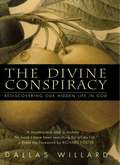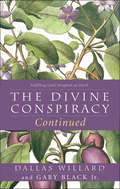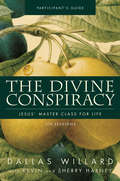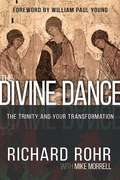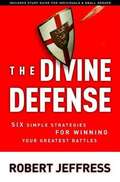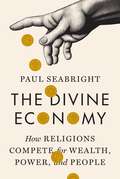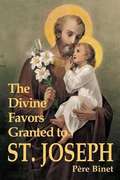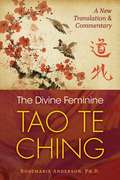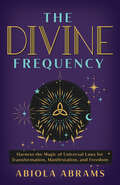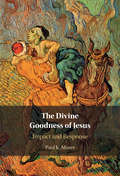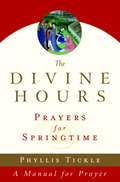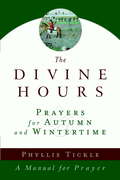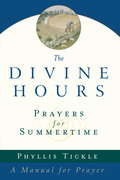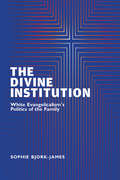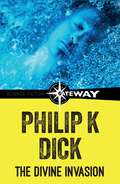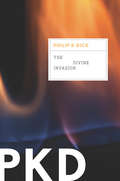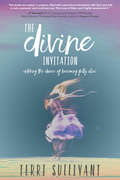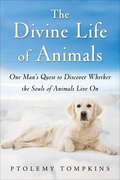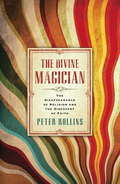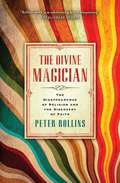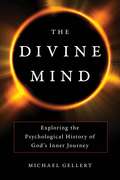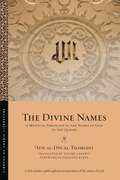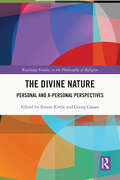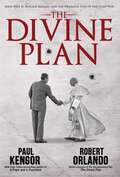- Table View
- List View
The Divine Conspiracy
by Dallas WillardA renowned teacher and writer of the acclaimed The Spirit of the Disciplines, Dallas Willard, one of today's most brilliant Christian thinkers now offers a timely and challenging call back to the true meaning of Christian discipleship. In The Divine Conspiracy, Willard gracefully weaves biblical teaching, popular culture, science, scholarship, and spiritual practice into a tour de force that shows the necessity of profound changes in how we view our lives and faith. In an era when many Christians consider Jesus a beloved but remote savior, Willard argues compellingly for the relevance of God to every aspect of our existence. Masterfully capturing the central insights of Christ's teachings in a fresh way for today's seekers, he helps us to explore a revolutionary way to experience God--by knowing Him as an essential part of the here and now, rather than only as a part of the hereafter."The most telling thing about the contemporary Christian," Willard writes, "is that he or she has no compelling sense that understanding of and conformity with the clear teachings of Christ is of any vital importance to [their] life, and certainly not that it is in any way essential . . . Such obedience is regarded as just out of the question or impossible." Christians, he says, for the most part consider the primary function of Christianity to be admittance to heaven. But, as Willard clearly shows, a faith that guarantees a satisfactory afterlife, yet has absolutely no impact on life in the here and now, is nothing more than "consumer Christianity" and "bumper-sticker faith."Willard refutes this "fire escape" mentality by exploring the true nature of the teachings of Jesus, who intended that His followers become His disciples, and taught that we have access now to the life we are only too eager to relegate to the hereafter. The author calls us into a more authentic faith and offers a practical plan by which we can become Christ-like. He challenges us to step aside from the politics and pieties of contemporary Christian practice and inspires us to reject the all too common lukewarm faith of our times by embracing the true meaning of Christian discipleship.
The Divine Conspiracy Continued: Fulfilling God's Kingdom on Earth
by Dallas Willard Gary Black Jr.Dallas Willard's bestselling book The Divine Conspiracy revolutionized how we understand Christian discipleship. Jesus is not a remote savior, waiting for us in heaven after we die, Willard taught, but a leader and teacher to whom we apprentice ourselves to fulfill what Jesus had in mind when he declared that the "kingdom of God has come." In The Divine Conspiracy Continued, Willard and theologian Gary Black Jr. lay out the next stage in God's plan as this generation's disciples enter into positions of leadership and transform the world from the inside out. Christians are not called to protect themselves from the world but to step into the world to lead and serve, and in doing so, bring the kingdom of God to earth. transform the world from the inside out. To fulfill the Christian calling is not to remove oneself from the outside world and take shelter from its shortcomings, Willard reminds us, but to step into the world to lead and serve as agents of change.
The Divine Conspiracy Participant's Guide: Jesus' Master Class for Life
by Dallas Willard Kevin HarneyRenowned teacher, writer of the acclaimed The Spirit of the Disciplines, and one of today's most brilliant Christian thinkers, Dallas Willard now offers a new six-session video study and participant’s guide—a timely and challenging call back to the true meaning of Christian discipleship. Gracefully weaving biblical teaching, popular culture, science, scholarship, and spiritual practice into one cohesive group study, Willard shows Christians everywhere the necessity of making profound changes in how we view our lives and live out our faith. This study masterfully captures the core of Christ's teachings in a fresh, relevant light, revealing a revolutionary way to experience God … by knowing Him as an essential part of the here and now, rather than only as a part of the hereafter. Based on the Sermon on the Mount, the author calls Christians into a more authentic faith and then offers a practical plan by which we can answer the call. In light of sales of the groundbreaking print book, thousands of Christians will enroll in “Jesus’ Master Class for Life” … The Divine Conspiracy. The Divine Conspiracy session titles include: The Divine Conspiracy The Path to a Blessed Life Becoming a Good Person Treasuring What Matters Most Becoming a Community of Prayerful Love Living as a Disciple of Jesus Designed for use with the video.
The Divine Dance: The Trinity and Your Transformation
by Richard Rohr Mike MorrellIn the pages of this book, internationally recognized teacher Richard Rohr circles around this most paradoxical idea as he explores the nature of God—circling around being an apt metaphor for this mystery we're trying to apprehend. Early Christians who came to be known as the "Desert Mothers and Fathers" applied the Greek verb perichoresis to the mystery of the Trinity. The best translation of this odd–sounding word is dancing. Our word choreography comes from the same root. Although these early Christians gave us some highly conceptualized thinking on the life of the Trinity, the best they could say, again and again, was, Whatever is going on in God is a flow—it's like a dance. But God is not a dancer—He is the dance itself. That idea might sound novel, but it is about as traditional as you can get. God is the dance itself, and He invites you to be a part of that dance. Are you ready to join in?
The Divine Defense: Six Simple Strategies for Winning your Greatest Battles
by Robert JeffressIt’s what youcan’tsee that can hurt you The temptation that regularly assaults you, the depression or illness that pulls you down, the discord in your relationships, the private doubts you harbor about God… These are not just a natural part of life–they’re battles in a behind-the-scenes war against your faith, family, and future. From a balanced perspective, Robert Jeffress lifts the curtain of everyday existence to reveal these invisible but very real battles in the war Satan wages against followers of Christ like you. Because you don’t have to be spiritual road kill… Using the spiritual armor of Ephesians 6,The Divine Defenseoutlines six practical strategies you can use through every day to defeat Satan’s vicious and destructive plan: ·Recognize and replace destructive thoughts (the belt of truth) ·Do what you know you should do (the breastplate of righteousness) ·Make God’s business your business (boots of the gospel of peace) ·Move forward in spite of doubts (the shield of faith) ·Remember your power to win (the helmet of salvation) ·Strengthen your resolve to resist (the sword of the spirit) Together, these strategies formThe Divine Defensethat will help you live victoriously in the unshakable power of God.
The Divine Economy: How Religions Compete for Wealth, Power, and People
by Paul SeabrightA novel economic interpretation of how religions have become so powerful in the modern worldReligion in the twenty-first century is alive and well across the world, despite its apparent decline in North America and parts of Europe. Vigorous competition between and within religious movements has led to their accumulating great power and wealth. Religions in many traditions have honed their competitive strategies over thousands of years. Today, they are big business; like businesses, they must recruit, raise funds, disburse budgets, manage facilities, organize transportation, motivate employees, and get their message out. In The Divine Economy, economist Paul Seabright argues that religious movements are a special kind of business: they are platforms, bringing together communities of members who seek many different things from one another—spiritual fulfilment, friendship and marriage networks, even business opportunities. Their function as platforms, he contends, is what has allowed religions to consolidate and wield power.This power can be used for good, especially when religious movements provide their members with insurance against the shocks of modern life, and a sense of worth in their communities. It can also be used for harm: political leaders often instrumentalize religious movements for authoritarian ends, and religious leaders can exploit the trust of members to inflict sexual, emotional, financial or physical abuse, or to provoke violence against outsiders. Writing in a nonpartisan spirit, Seabright uses insights from economics to show how religion and secular society can work together in a world where some people feel no need for religion, but many continue to respond with enthusiasm to its call.
The Divine Favors Granted to St. Joseph
by Pere BinetThis books sets forth the most exalted stature of St. Joseph in the Communion of Saints.
The Divine Feminine Tao Te Ching: A New Translation and Commentary
by Rosemarie Anderson• Restores the feminine essence of the Tao Te Ching as well as the simplicity and poetic undertones of the chapters • Offers commentary for each of the 81 chapters and key Chinese characters to reveal their profound wisdom • Translated from ancient silk and bamboo slip manuscripts, the oldest known copies of the Tao Te Ching • Paper with French flaps In this book, Rosemarie Anderson shares her discoveries of the Divine Feminine Tao alongside her original translation of the Tao Te Ching. Working from ancient silk and bamboo slip manuscripts, the oldest known copies of the Tao Te Ching, the author slowly translated all 81 chapters over the course of two years, allowing each section to reveal its intimate poetic and spiritual nature. To her surprise, she discovered that the Tao was unmistakably feminine, consistently referred to as &“mother,&” &“virgin,&” and the &“womb&” of creation. Anderson explains how the Tao is a feminine force, the Dark Womb of Creation, the Immortal Void renewing life again and again in ordinary times and in times of crisis. She offers commentary for each of the 81 chapters to help reveal their profound wisdom. The author also restores the chapters&’ simplicity and musical undertones, explaining how, in the original Chinese manuscripts, the text is poetic and rhymed because the Tao Te Ching was often recited or sung--yet most English translations are written in scholarly prose with long sentences and complex syntax. She shows how the great Tao&’s message of wei wu wei--&“act without acting&” and &“do without doing&”--offers a path of peace and well-being for ourselves and for our relationships with others and the earth, a path that arises from spontaneous action that seeks no gain for the self. Capturing the original feminine nature of this ancient text, Anderson&’s translation sheds new light on the esoteric wisdom contained within the Tao Te Ching and on the mystical feminine essence of the Tao.
The Divine Frequency: Harness the Magic of Universal Laws for Transformation, Manifestation, and Freedom
by Abiola AbramsActionable and practical advice to help you fine-tune your vibe, manifest your desires, attract what you want, and navigate obstacles with ease using Universal Laws—the universe's most potent secrets.The Divine Frequency is the frequency of God consciousness, the very essence of conscious creation. In this book, Abiola Abrams shows readers how to use the Universal Laws, like the Law of Attraction, to reach this frequency. The Universal Laws are the pathway to aligning ourselves with this sacred frequency, empowering us to manifest our desires.Every page shows you (in simple language) how to sync up with the cosmic groove and unlock a life that's brimming with joy, meaning, and yes, a whole lot of magic. The Divine Frequency strips away the mystique of the Universal Laws, serving them up in bite-size, actionable pieces that will fit right in to your daily hustle.You'll get inspiration and practical advice that'll have you fine-tuning your vibe, manifesting and attracting what you want, and navigating obstacles with ease. Plus, dive into stories that prove how real people—maybe even someone like you—have harnessed these laws to transform their lives from mundane to miraculous.
The Divine Goodness of Jesus: Impact and Response
by Paul MoserIn this book, Paul Moser explores Jesus' role as God's filial inquirer and clarifies a method of inquiry regarding Jesus, one that offers a compelling explanation regarding his experiential impact and his audience's response. Moser's method values the roles of history and moral/religious experience in inquiry about him, and it saves inquirers from distorting biases in their inquiry. His study illuminates Jesus' puzzling features, including his challenging question for inquirers of him (Who do you say I am?), his distinctive experience of God as father, his reference to himself as 'the son of man', his attitude toward his suffering and death, his unique role in the kingdom of God, and his understanding of his allegedly miraculous signs and of his parables and good news. The book also makes sense of evidence for the reality and the main purpose of Jesus.
The Divine Hours (Volume Three): A Manual for Prayer
by Phyllis TickleThe third and final volume in a trilogy of prayer manuals compiled by Publishers Weekly religion editor Phyllis Tickle as a contemporary Book of Hours to guide Christians gently yet authoritatively through the daily offices.The Divine Hours is the first major literary and liturgical reworking of the sixth-century Benedictine Rule of fixed-hour prayer. This beautifully conceived and thoroughly modern three-volume guide will appeal to the theological novice as well as to the ecclesiastical sophisticate. Making primary use of the Book of Common Prayer and the writings of the Church Fathers, The Divine Hours is also a companion to the New Jerusalem Bible, from which it draws its Scripture readings. The trilogy blends prayer and praise in a way that, while extraordinarily fresh, respects and builds upon the ancient wisdom of Christianity. The third and final book in the set, Prayers for Springtime, provides prayers, psalms, and readings for this season associated with rebirth. Compact, it is perfect for those seeking greater spiritual depth. As a contemporary Book of Hours, The Divine Hours: Prayers for Springtime heralds a renewal of the tradition of disciplined daily prayer, and gives those already using the first two volumes the completion they are seeking. With this volume, the series culminates with three prayer manuals encompassing the liturgical and calendar year with the offices for every day.
The Divine Hours: Prayers for Autumn and Wintertime (Divine Hours)
by Phyllis TickleThe second volume in a trilogy of prayer manuals compiled by Publishers Weekly religion editor Phyllis Tickle as a contemporary Book of Hours to guide Christians gently yet authoritatively through the daily offices.The Divine Hours is the first major literary and liturgical reworking of the sixth-century Benedictine Rule of fixed-hour prayer. This beautifully conceived and thoroughly modern three-volume guide will appeal to the theological novice as well as to the ecclesiastical sophisticate. Making primary use of the Book of Common Prayer and the writings of the Church Fathers, The Divine Hours is also a companion to the New Jerusalem Bible, from which it draws its Scripture readings. The trilogy blends prayer and praise in a way that, while extraordinarily fresh, respects and builds upon the ancient wisdom of Christianity. The second book in the set, Prayers for Autumn and Wintertime, provides prayers, psalms, and readings for these two festive seasons. Compact, it is perfect for those seeking greater spiritual depth. As a contemporary Book of Hours, The Divine Hours: Prayers for Autumn and Wintertime heralds a renewal of the tradition of disciplined daily prayer, and gives those already using the first volume the continuity they are seeking. The series will culminate in a third volume for springtime, completing the liturgical and calendar year with the offices for every day.From the Trade Paperback edition.
The Divine Hours: Prayers for Summertime (Divine Hours)
by Phyllis TickleThe first volume in a trilogy of prayer manuals compiled by Publishers Weekly religion editor Phyllis Tickle as a contemporary Book of Hours to guide Christians gently yet authoritatively through the daily offices.The Divine Hours is the first major literary and liturgical reworking of the sixth-century Benedictine Rule of fixed-hour prayer. This beautifully conceived and thoroughly modern three-volume guide will appeal to the theological novice as well as to the ecclesiastical sophisticate. Making primary use of the Book of Common Prayer and the writings of the Church Fathers, The Divine Hours is also a companion to the New Jerusalem Bible, from which it draws its Scripture readings. The trilogy blends prayer and praise in a way that, while extraordinarily fresh, respects and builds upon the ancient wisdom of Christianity.The first book in the set, Prayers for Summertime, filled with prayers, psalms, and readings, is one readers will turn to again and again. Compact in size, it is perfect for those seeking greater spiritual depth. As a contemporary Book of Hours, The Divine Hours: Prayers for Summertime heralds a renewal of the tradition of disciplined daily prayer, and will whet the hunger of a large and eager audience for the follow-up autumn/winter and spring volumes.
The Divine Institution: White Evangelicalism's Politics of the Family
by Sophie Bjork-JamesThe Divine Institution provides an account of how a theology of the family came to dominate a white evangelical tradition in the post-civil rights movement United States, providing a theological corollary to Religious Right politics. This tradition inherently enforces racial inequality in that it draws moral, religious, and political attention away from problems of racial and economic structural oppression, explaining all social problems as a failure of the individual to achieve the strong gender and sexual identities that ground the nuclear family. The consequences of this theology are both personal suffering for individuals who cannot measure up to prescribed gender and sexual roles, and political support for conservative government policies. Exposure to experiences that undermine the idea that an emphasis on the family is the solution to all social problems is causing a younger generation of white evangelicals to shift away from this narrow theological emphasis and toward a more social justice-oriented theology. The material and political effects of this shift remain to be seen.
The Divine Invasion
by Philip K DickDeep in cryonic suspension, Herb Asher thought he was still happily pottering around in his own star system dome, listening to music. Instead, someone took advantage of him being such a nice guy, and Herb had married the terminally ill woman in the next dome.It all seems strangely familiar - and now he has to go through it all again. And could it be that he is unwittingly going to assist in the invasion of his home planet - and perhaps the second coming...?Part science fiction adventure, part religious inquiry, The Divine Invasion questions just how much anyone really knows about the nature of reality and God.
The Divine Invasion: Valis And Later Novels - A Maze Of Death; Valis; The Divine Invasion; The Transmigration Of Timothy Archer (VALIS Trilogy #2)
by Philip K. DickA science fiction spin on the story of Jesus&’s nativity, from the iconic author of Do Androids Dream of Electric Sheep?God is not dead, he has merely been exiled to an extraterrestrial planet. And it is on this planet that God meets Herb Asher and convinces him to help retake Earth from the demonic Belial. Featuring virtual reality, parallel worlds, and interstellar travel, The Divine Invasion blends philosophy and adventure in a way few authors can achieve. As the middle novel of Dick&’s VALIS trilogy, The Divine Invasion plays a pivotal role in answering the questions raised by the first novel, expanding that world while exploring just how much anyone can really know—even God himself.
The Divine Invitation: Entering the Dance of Becoming Fully Alive
by Terri SullivantAre you ready to enter the dance of becoming fully alive?Have you ever wondered, if we have the God of heaven and earth living inside us, why aren&’t we experiencing more in life? Why aren&’t we seeing more transformation in ourselves, or in others for that matter? What does it look like to have &“Jesus in me&” anyway, as an individual and also as a woman? These are the questions life coach and pastor Terri Sullivant was asking herself when God answered her in a profound, life-changing way.The Divine Invitation provides a pathway to find what your heart deeply longs for in every area of life. It&’s a metaphor showing the way for every woman to enter the dance of becoming fully alive. Learning this dance is about developing a relationship with Jesus, like two people dancing skillfully and gracefully. It&’s about becoming so entwined with the thoughts, words, emotions, and behaviors of Jesus that the two of you are one. You find that this deep connection transcends all of life, enabling you to live joyfully and freely, come what may.
The Divine Life of Animals: One Man's Quest to Discover Whether the Souls of Animals Live on
by Ptolemy TompkinsA journey through 20,000 years of history and myth in search of the answer to a single question: Do animals have souls? Anyone who has ever mourned the loss of a cherished pet has wondered about the animal soul. Do animals survive the death of the body, or are they doomed to disappear completely when they leave this world behind? Both scientists and religious authorities have long scoffed at the idea of animals in heaven. Yet the question endures. In this wise, immensely readable book, Ptolemy Tompkins embarks on a quest for the answer-taking us on a top-speed tour of the history of the animal soul. Equally at home with mainstream and alternative spiritual philosophies, Tompkins takes us from the savannas of Africa to the earth's first cities to the early days of the great faith traditions of both East and West. Along the way, he shows that, despite what many of us have been taught, the world's various spiritual traditions all have profoundly meaningful things to say about the animal soul, if we simply know where to look. Rescuing these ancient insights and blending them with vivid stories about animals today-from a dwarf rabbit named Angus to a manatee named Moose to a black bear named Little Bit-The Divine Life of Animals paints a gloriously inclusive picture of the cosmos as a place made up of both matter and spirit, in which animals are every bit as important, spiritually speaking, as the humans with whom they share the world. Though it is startlingly original, The Divine Life of Animals also feels strangely and instantly familiar, for it reveals truths that many of us have held in our hearts already, waiting only for someone to give fresh voice to one of the oldest and most trustworthy intuitions we possess. The Divine Life of Animals offers a compelling and timeless vision of the relationship between humans and animals that will have you looking at the animals in your life with new eyes.
The Divine Magician: The Disappearance of Religion and the Discovery of Faith
by Peter RollinsPeter Rollins knows one magic trick - now, make sure you watch closely. It has three parts: the Pledge, the Turn, and the Prestige. In The Divine Magician, each part comes into play as Rollins describes the way God works in our world today, and how this connection helps us understand the truly radical message of Christianity.The Divine Magician interrogates traditional religious notions from a refreshingly original perspective, undermining the commonplace debates involving dogma, doctrine, and tradition.Rejecting our preconceptions of what the spiritual and the religious mean, Rollins argues for a deeply material faith that finds meaning not in a set of beliefs, but in a passionate commitment to the world.This incendiary reading of Christianity breaks the boundaries of religion and overturns the tables of conventional wisdom. It offers hope for those seeking a depth and density in life, calling for the existing church to disappear, only to reappear in a fundamentally new and dynamic form.
The Divine Magician: The Disappearance of Religion and the Discovery of Faith
by Peter RollinsIn this mind-bending exploration of traditional Christianity, firebrand Peter Rollins turns the tables on conventional wisdom, offering a fresh perspective focused on a life filled with love.Peter Rollins knows one magic trick—now, make sure you watch closely. It has three parts: the Pledge, the Turn, and the Prestige. In Divine Magician, each part comes into play as he explores a radical view of interacting with the world in love. Rollins argues that the Christian event, reenacted in the Eucharist, is indeed a type of magic trick, one that is echoed in the great vanishing acts performed by magicians throughout the ages. In this trick, a divine object is presented to us (the Pledge), disappears (the Turn), and then returns (the Prestige). But just as the returned object in a classic vanishing act is not really the same object—but another that looks the same—so this book argues that the return of God is not simply the return of what was initially presented, but rather a radical way of interacting with the world. In an effort to unearth the power of Christianity, Rollins uses this framework to explain the mystery of faith that has been lost on the church. In the same vein as Rob Bell&’s bestseller Love Wins, this book pushes the boundaries of theology, presenting a stirring vision at the forefront of re-imagined modern Christianity. As a dynamic speaker as he is in writing, Rollins examines traditional religious notions from a revolutionary and refreshingly original perspective. At the heart of his message is a life lived through profound love. Just perhaps, says Rollins, the radical message found in Christianity might be one that the church can show allegiance to.
The Divine Milieu
by Pierre Teilhard De ChardinTeilhard de Chardin's The Divine Milieu expands on the spiritual message so basic to his thought. He shows how man's spiritual life can become a participation in the destiny of the universe. Teilhard de Chardin -- geologist, priest, and major voice in twentieth-century Christianity -- probes the ultimate meaning of all physical exploration and the fruit of his own inner life. The Divine Milieu is a spiritual treasure for every religion bookshelf.
The Divine Mind: Exploring the Psychological History of God's Inner Journey
by Michael GellertA Jungian psychoanalyst with a background in Judaism and Zen Buddhism explores the history of God concepts in the Judeo-Christian and Islamic traditions.This book is about the Abrahamic God’s inner journey, an epic that begins in the Hebrew Bible—the common source of Judaism, Christianity, and Islam. This God emerges as a living, textured personality as tormented as a Shakespearean character and as divided against humanity as the devil who personifies his dark side. Yet in heroic fashion, he embarks on a journey to greater consciousness, stretching into himself in the Talmud, New Testament, Qur’an, and Gnostic writings. Then finally, with and through the Jewish, Christian, and Islamic mystics, he discovers his true self as the absolute Godhead. He takes up residence in their psyches as their own Divine Mind or true self. The book suggests that what God learned from his journey might be something that we in turn could learn from and that could help us at the dawn of the twenty-first century. In this way, God’s inner journey becomes a metaphor for our own. Michael Gellert, a Jungian psychoanalyst, treats this story and the sacred writings that convey it as psychological facts—as expressions of the human psyche—regardless of whether or not God actually exists. He shows how the Hebrew Bible presents God as a primitive, barbaric tribal war god while centuries later the mystics portray him as their innermost essence and emptied of all projected, external, anthropomorphic images. Thus, God’s inner journey and the evolution of human consciousness—his story and ours—parallel each other and are integrally related. Rich in historical detail and psychological insights, this is a book that will be welcomed by seekers of every background and orientation.
The Divine Names: A Mystical Theology of the Names of God in the Qurʾan (Library of Arabic Literature)
by ʿAfīf al-Dīn al-TilimsānīA Sufi scholar’s philosophical interpretation of the names of GodThe Divine Names is a philosophically sophisticated commentary on the names of God. Penned by the seventh-/thirteenth-century North African scholar and Sufi poet ʿAfīf al-Dīn al-Tilimsānī, The Divine Names expounds upon the one hundred and forty-six names of God that appear in the Qurʾan, including The All-Merciful, The Powerful, The First, and The Last. In his treatment of each divine name, al-Tilimsānī synthesizes and compares the views of three influential earlier authors, al-Bayhaqī, al-Ghazālī, and Ibn Barrajān.Al-Tilimsānī famously described his two teachers Ibn al-ʿArabī and al-Qūnawī as a “philosophizing mystic” and a “mysticizing philosopher,” respectively. Picking up their mantle, al-Tilimsānī merges mysticism and philosophy, combining the tenets of Akbarī Sufism with the technical language of Aristotelian, Neoplatonic, and Avicennan philosophy as he explains his logic in a rigorous and concise way. Unlike Ibn al-ʿArabī, his overarching concern is not to examine the names as correspondences between God and creation, but to demonstrate how the names overlap at every level of cosmic existence. The Divine Names shows how a broad range of competing theological and philosophical interpretations can all contain elements of the truth.An English-only edition.
The Divine Nature: Personal and A-Personal Perspectives (Routledge Studies in the Philosophy of Religion)
by Georg Gasser Simon KittleThis book is the first systematic treatment of the strengths and limitations of personal and a-personal conceptions of the divine. It features contributions from Jewish, Islamic, Chinese, Indian and naturalistic backgrounds in addition to those working within a decidedly Christian framework. This book discusses whether the concept of God in classical theism is coherent at all and whether the traditional understanding of some of the divine attributes need to be modified. The contributors explore what the proposed spiritual and practical merits and demerits of personal and a-personal conceptions of God might be. Additionally, their diverse perspectives reflect a broader trend within the analytic philosophy of religion to incorporate various non-Western religious traditions. Tackling these issues carefully is needed to do justice to the strengths and limitations of personal and a-personal accounts to the divine. The Divine Nature: Personal and A-Personal Perspectives will be of interest to scholars and advanced students working in philosophy of religion and philosophical theology.
The Divine Plan: John Paul II, Ronald Reagan, and the Dramatic End of the Cold War
by Paul Kengor Robert OrlandoJust six weeks apart in the spring of 1981, Pope John Paul II and President Ronald Reagan took bullets from would-be assassins. Few realized at the time how close both men came to dying. Surviving these near-death experiences created a singular bond between the pope and the president that historians have failed to appreciate. When John Paul II and Reagan met only a year later, they confided to each other a shared conviction: that God had spared their lives for a reason. That reason? To defeat Communism. In private, Reagan had a name for this: "The DP"—the Divine Plan. * * * It has become fashionable to see the collapse of the Soviet empire as inevitable. Hardly. In this riveting book, bestselling author Paul Kengor and writer-director Robert Orlando show what it took to end the Cold War: leaders who refused to accept that hundreds of millions must suffer under totalitarian Communism. And no leaders proved more important than the pope and the president. Two men who seemed to have little in common developed an extraordinary bond—including a spiritual bond between the Catholic pope and Protestant president. And their shared core convictions drove them to confront Communism. To tell the full story of the dramatic closing act of the Cold War, Kengor and Orlando draw on their exhaustive research and exclusive interviews with more than a dozen experts, including well-known historians Douglas Brinkley, H. W. Brands, Anne Applebaum, Stephen Kotkin, John O'Sullivan, and Craig Shirley; the leading biographer of John Paul II, George Weigel; close Reagan advisers Richard V. Allen and James Rosebush; and Cardinal Timothy Dolan and Bishop Robert Barron. You can't understand Pope John Paul II and President Ronald Reagan—or how the Cold War came to such a swift and peaceful end—without understanding how much faith they put in the Divine Plan.
